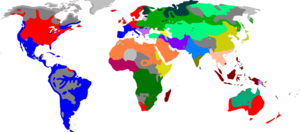Middle Semitic
This article is a collaborative project, so by all means, jump in! Your help is wanted and appreciated! |
| Middle Semitic | |
|---|---|
| ܫܡܥ ܡܪܟܙ | |
 | |
| Writing | w:Syriac alphabet |
| Region: | w:Arab world |
| Genders: | 2 |
| Cases: | 0 |
| Alignment | Nominative-Accusative |
| Proto-language: | w:Proto-Semitic language |
| Typology: | Fusional |
| Word-Order | SVO |
| Languages: | w:Maghrebi Arabic, |
| Population: | 290 million |
 | |
|
Africa: SEDES • Middle Semitic • Kintu • Guosa Central Asia: Jalpi • Caucas • Zens • Dravindian • Neo-Sanskrit Europe: Intralingua • Folksprak • Interslavic • Balkan • Samboka Far East: Dan'a'yo • IM • MSEAL | |
Anthropology
Jews, Muslims, and Christians get an equal vote, though most aspects are created logically, and not derivationally. Whenever possible, the many dialects of Arabic are consulted, as well as modern Israeli.
Phonology
22 consonant, 5 vowels. The sounds, n IPA, with spirantization listed as allophones: a, b~β, d~ð, e, g~ɣ, h, ħ, i, j, k~x, l, m, n, o, p~ɸ, q, r, s, s', ʃ, t, t', u, w, z, ʔ, ʕ
Orthography
There is not an exact middle between all the languages. A compromise position is needed at every turn. Neo-Aramaic is the best "middle ground". (RTL) ʾalap, bet, gamal, dalat, he, wo, zen, ḥe, ṭet, yod, kap, lamad, mim, nun, samkat, ʿe, pe, ṣade, qop, reš, šin, to.
Morphophonology
Pronouns comes in full and cliticized forms. Verbs conjugate for person, number, gender, mood, voice, and stem. The dual is only used in certain cases. Adjectives inflect for number, state, and gender.
Morphosyntax
Word-order is SVO and without case, this is rather strictly enforced. Pro-drop is common due to verbal inflection.
Lexicography
For a comparative Swadesh list see Middle Semitic/Swadesh
- ܡܠܟܐ}} - malkâ - kind
- ܕܡܐ - damâ - blood
- ܐܝܨܒܥܐ - 'eṣba`â - finger (f) root unclear, not ṣb`, which is "color"
- ܪܐܣܐ - râsâ - head
- ܠܣܢܐ - lisnâ - tongue/language
- ܥܝܢܐ - `enâ - eye/spring
- ܝܕܐ - yidâ - hand
- ܘܙܢܐ - wuznâ - ear
- ܥܜܡܐ - `aṭmâ - bone
- ܢܗܪܐ - nahrâ - river
- ܒܪܩܐ - barqâ - lightning
- ܝܘܡܐ - yomâ - day
- ܠܝܠܐ - lelâ - night
- ܓܡܠܐ - gamlâ - camel
- ܙܝܐܒܐ - ze'bâ - wolf
- ܚܙܝܪܐ - ḥazirâ - pig (root?!)
- ܒܗܥܡܐ - bahemâ - beast
- ܟܠܒܐ - kalbâ - dog
- ܒܩܪܐ - baqra - cattle
- ܢܡܠܐ - namlâ - ant
- ܙܒܘܒܐ - zavuva - fly (noun)
- ܪܐܝ - ra'e - to see
- ܣܡـ - sama` - to hear
- ܐܟܠ - 'axal - to eat
- ܟܬܒ - katab - to write
- ܣܐܠ - sa'al - to ask
- ܩܪܐ - qara' - to read
- ܩܐܡ - qâm - to rise
- ܠܒܣ - lavas - to wear
- ܫܖܪܐ - ša`râ - entrance/opening
- ܖܤܒܐ - `eṣba - angry grief
- ܩܪܢܐ - qarna - horn
- ܙܪܖ - to sow/plant
- ܟܢܔܐ - kanpa - wing
- ܡܜܪܐ - maṭrâ - rain
- ܢܖܡ - na`am - to please
- ܢܘܪܐ - nurâ - fire/light
- ܫܘܡܐ - šumâ - garlic
- ܫܘܪܐ - šorâ - bull
- ܙܪܖܐ - zar`â - arm
- ܙܪܚ - zavaḥ - to slaughter
- ܚܜܐܐ - ḥaṭ'â - sin
- ܣܠܡ - salam - to be at peace/fulfilled
- ܪܐܣܐ - râsâ - head
}}
